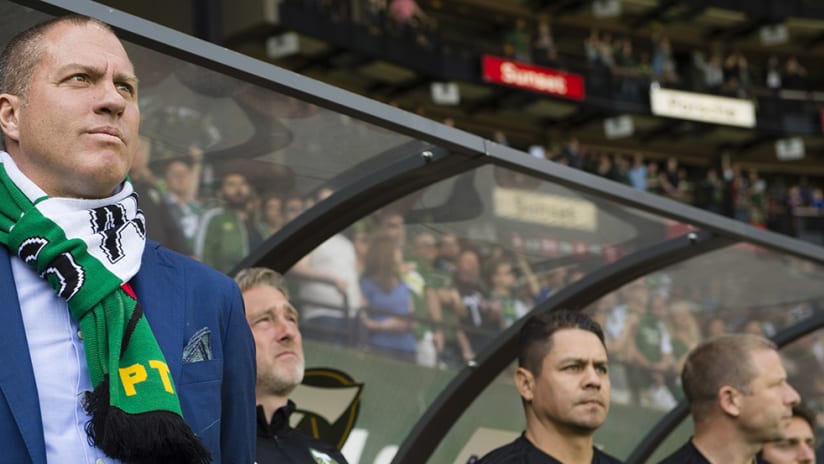It was gloomy at first in Portland.
Zero wins in the first five games. Minus-six goal differential. An embarrassing loss to a team of New York Red Bulls reserves.
And it appeared to be getting cloudier.
On April 8th, the Portland Timbers blew a 2-0 lead in the last 10 minutes to lose 3-2 to Orlando City. Two points from five games left the Timbers bottom of the West.
But April 8th was the last time the Timbers suffered defeat. They're 7-0-3 in 10 games since. And on Saturday, the Timbers recorded their first MLS regular-season win in Seattle.
Last year's top-seeded team in the Western Conference, Portland were probably better than their early-season record suggested; the first five games came on the road. Every team in MLS bar one (Atlanta) has a worse record on the road than at home in 2018. Portland started the season away at the LA Galaxy, RBNY, FC Dallas, the Chicago Fire and Orlando – each a traditionally tough venue. (Linchpin Diego Chara also missed the first two games, and the Timbers almost never win without Chara.) Having those matches squeezed into the beginning of the season will almost always create unreliable noise, and, by consequence, stress.
At the same time, those struggles led them to improve. The Timbers adjusted to fix their early problems, and head coach Gio Savarese deserves a ton of credit.
The Timbers have devised the most defined, we-don’t-care-that-the-whole-league-knows-what-we-do-because-nobody-has-stopped-it-yet style in the league.
After the Orlando game, the Timbers simplified their system and focused on doing two things extremely well: restricting space in key areas and captializing on their counters.
Savarese has tinkered with different formations during the unbeaten run – 4-3-2-1, 5-3-2, 4-4-2 – and each of them have one thing in common: When the team drops back into shape, they have three players in central zones in front of the center backs. At times, they give up a lot of time and space in wide channels, but they don’t care because they almost always dominate the central areas.

They crowd key zones defensively, and remain disciplined to ensure they are never vacated. Consequently, opponents find it hard to get good scoring opportunities. Through the first five games, Portland had conceded 12 goals, the most in the league through that point. In the 10 games since, they have conceded nine times.
It’s not a change of formation that’s mattered, but rather the commitment to a principle.
After Portland beat LAFC, 2-1, in mid-May, LAFC head coach Bob Bradley told reporters that, "[Portland's] block of seven, their four defenders and then the way those three defenders are dropped in, they’re very compact. Your ability to get through their [defense] is challenged.”
Once Savarese established a defensive foundation, he added the second element, the attacking side. With opponents stretching themselves out seeking usable space on the field, Portland have been attacking quickly on the counter. Diego Valeri, Sebastian Blanco, and Samuel Armenteros fly down the field and exploit the space before the opponent has time to recover.
More precisely, they simply don’t slow down as they reach the defenders. It sounds small, but attackers on the counter often shift to a lower gear as they decide what to do; in doing so, the attacker cedes the advantage gained by sprinting at a backpedaling opponent -- slowing down levels the playing field. The Timbers never let the defenders off the hook. They trust their skills and don’t get discouraged by mistakes.
None of this is revolutionary. It’s not exactly innovative to sit and counter. They do something basic, but they do it extraordinarily well.
Every team that has faced the Timbers over the last two months has known how Savarese’s men are going to play. Portland looks them in the eye and does it anyway. Nobody has been able to beat them. It’s come down to execution, and the Timbers have out-executed all comers.
Given the randomness of game action, there's a value in knowing a team will execute consistently, even if it’s just basics. Opponents will begin to adjust to this shift by the Timbers, and better prepare for them.
The Timbers evolved the first time opponents got the better of them. They can do it again.














